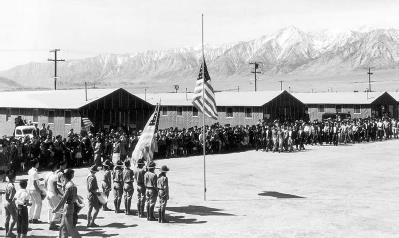The Stone Court (1941–46)Commerce Clause |
In what decision did the U.S. Supreme Court unanimously uphold exclusion and curfew orders imposed on Japanese citizens during wartime? |
The U.S. Supreme Court unanimously upheld the exclusion and curfew of Japanese Americans in Hirabayashi v. United States (1943). The case involved the prosecution of Gordon Hirabayashi, an American-born University of Washington senior who was of Japanese descent. Hirabayashi was charged with failing to report to a military evacuation center and for failing to adhere to a curfew that required Japanese residents to remain in their homes at 8:00 PM.
Chief Justice Harlan Fiske Stone wrote for the Court that the orders, which classified citizens on the basis of race, were constitutional under the extraordinary circumstances that faced the United States after Japan’s attack on Pearl Harbor on December 7, 1941: “Whatever views we may entertain regarding the loyalty to this county of the citizens of Japanese ancestry, we cannot reject as unfounded the judgment of the military authorities and of Congress that there were disloyal members of that population, whose number and strength could not be precisely and quickly ascertained.” Hirabayashi had argued that it was unconstitutional for the military commander to impose special conditions just on citizens of Japanese descent. However, Stone wrote that the fact that the United States “was threatened by Japan rather than another enemy power set these citizens apart from others who have no particular associations with Japan.”
The decision was unanimous, though three justices authored concurring opinions—Justices William O. Douglas, Frank Murphy, and Wiley Rutledge. Murphy’s opinion at times reads more like a dissent. He wrote that “distinctions based on color and ancestry are utterly inconsistent with our traditions and ideals.” However, Murphy still voted in favor of the government because of what he termed the “critical military situation which prevailed on the Pacific Coast area in the spring of 1942.”

